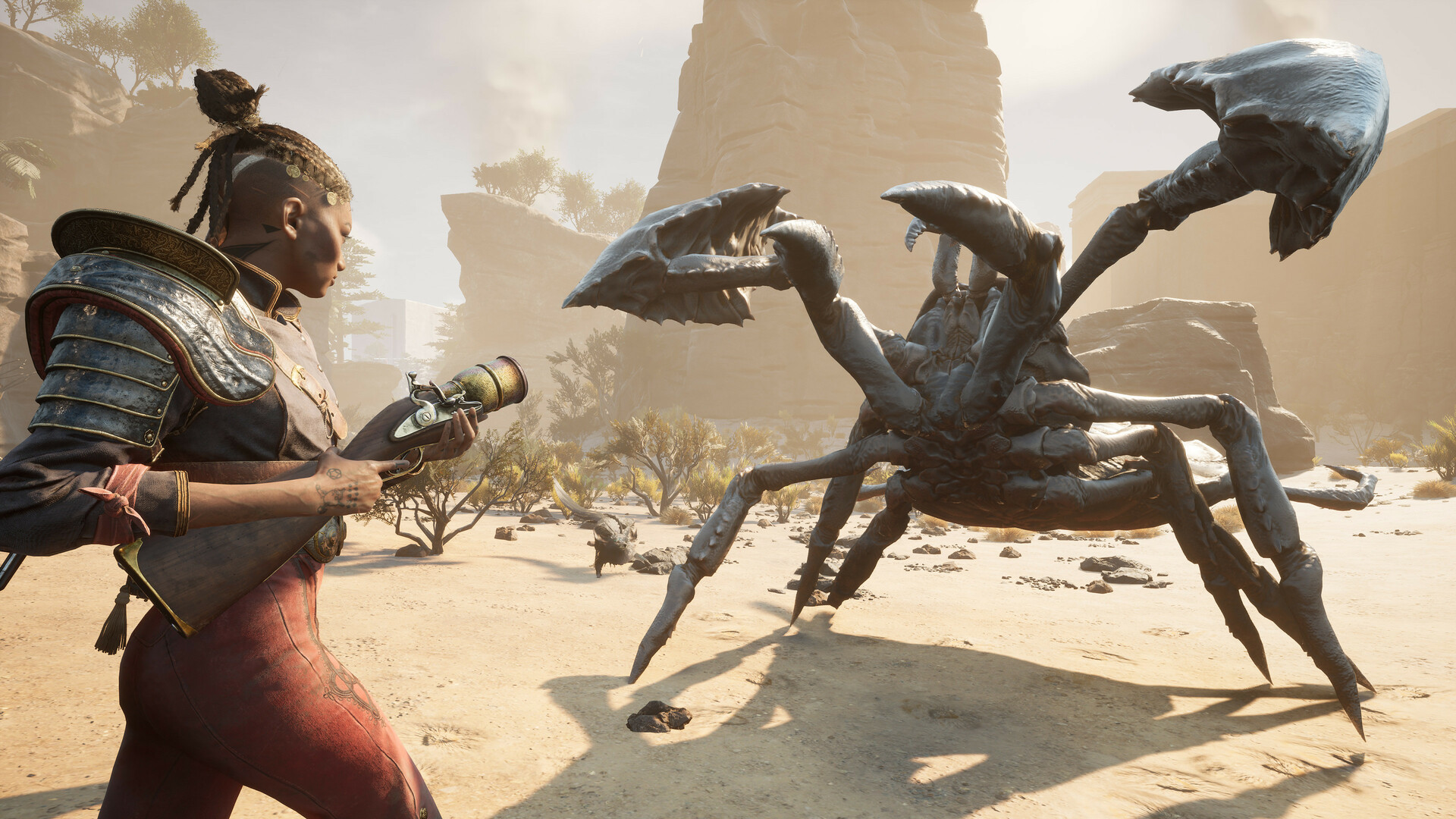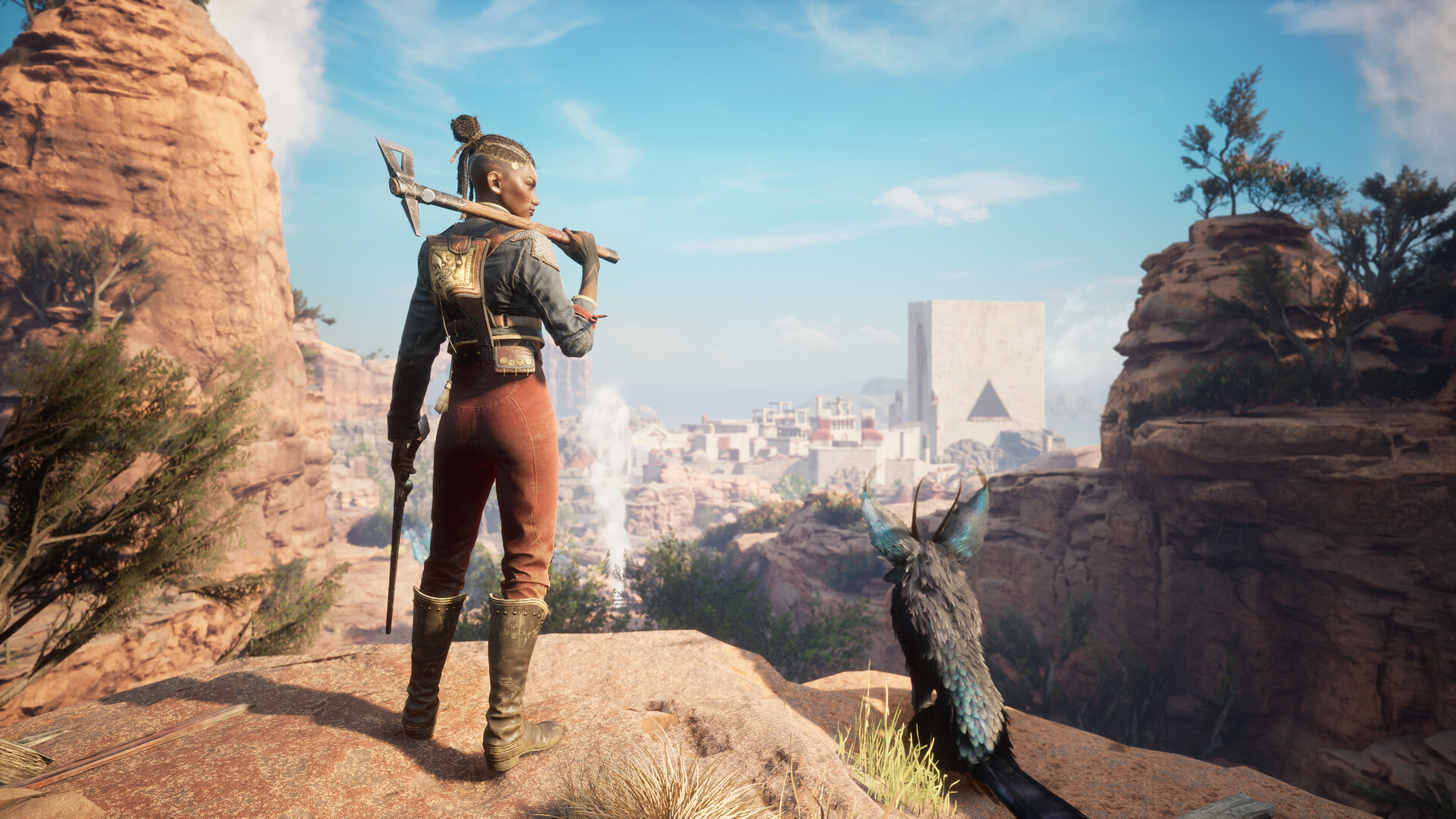In 2018, indie New Zealand studio A44 announced itself to the world with its debut project, Ashen, a gorgeous experience set in a desolate and minimalistic world, delivering a traditional, solid Soulslike experience, albeit with some frustrating difficulty and balancing issues. Six years on from its debut, A44 is back with its sophomore outing, and though Flintlock: The Siege of Dawn still incorporates a lot of the elements that are commonly associated with the Soulslike subgenre, its goal is to deliver a much more approachable action RPG experience. It is, of course, not the first game to have attempted to skirt that line- but I can confidently say that few games have done it quite as well as Flintlock does.
In everything from the structure of its world, how it punishes death, its approach to difficulty, and how it handles exploration, Flintlock: The Siege of Dawn scratches that very specific Soulslike itch- which, of course, is something that we know A44 is capable of delivering, courtesy of Ashen. At the same time, however, Flintlock is also a much more forgiving game with a much lower barrier for entry, whether that’s because of the multiple difficulty options available, because of combat just generally not being as difficult as it is in most traditional Soulslikes, or because of more granular elements, like how generous it is with checkpoints or fast travel.
“In everything from the structure of its world, how it punishes death, its approach to difficulty, and how it handles exploration, Flintlock: The Siege of Dawn scratches that very specific Soulslike itch- which, of course, is something that we know A44 is capable of delivering, courtesy of Ashen. At the same time, however, Flintlock is also a much more forgiving game with a much lower barrier for entry.”
But first things first- let’s talk about what Flintlock exactly is. Set in the world of Kian, it goes all in on the flintlock fantasy aesthetic, as its name suggests, which means a combination of all the traditional fantasy elements combined with an early modern setting and early traces of technology. In and of its own, it’s a strong aesthetic, and it’s one that the game uses to great effect, instantly carving out a unique visual identity for itself and the world that it is set in. You play as Nor Vanek, an elite soldier who, accompanied by the mysterious fox-like entity named Enki, is tasked with defeating powerful beings that have escaped out into the world from the Great Below and are now wreaking absolute havoc, to put it mildly.
Flintlock: The Siege of Dawn doesn’t fully commit to the Soulslike bit in the narrative and storytelling department either. True to the genre’s usual trappings, it does have cryptic notes and bits and pieces of text scattered about that vaguely allude to new details about the lore, like new puzzle pieces waiting to be put together, but at the same time, Flintlock also isn’t as averse to conventional storytelling methods and staples as Soulslikes often tend to be. There’s plenty of cutscenes, not all characters that you speak to insist on speaking in riddles, and there are even towns and settlements in the world that are populated with NPCs that you can interact or even play minigames with.
How well does it work? Well, storytelling isn’t where Flintlock’s strengths lie. As I mentioned, I think it boasts a strong setting (where the aesthetic does a lot of the heavy-lifting), but where the story itself is concerned, the game is serviceable at best. There are times where I enjoyed the interactions between Nor Vanek and Enki, and learning more about the world of Kian and its lore was always captivating, but by and large, the story was never anything beyond passably interesting, and rarely was it anywhere close to being the thing that was keeping me playing.
“Flintlock boasts a strong setting (where the aesthetic does a lot of the heavy-lifting), but where the story itself is concerned, the game is serviceable at best.”
There is, however, plenty else that will keep you playing in Flintlock. The combat, for instance, is an absolute blast. Flintlock: The Siege of Dawn is a much more approachable flavour of Soulslike, which means even on normal difficulty, it’s not as difficult as a lot of other games in the genre, but it still does maintain a decent level of challenge, while also nailing most of the fundamentals quite well. Chaining together attacks, dodges, and parries feels good on a core, moment-to-moment level, especially as the game starts throwing an increasing variety of enemies at you, each bringing their own unique challenges. Meanwhile, combat also feels generally faster than it does in most Soulslikes, with Nor Vanek’s movements being much more nimble and athletic.
Beyond that, the game throws in additional mechanics as new wrinkles in the proceedings, like armoured or shielded enemies presenting different obstacles, a variety of firearms to use for ranged options, or using Witherings to unleash powerful and magical abilities during fights. Chief among Flintlock’s own twists on familiar ideas, however, is the Reputation system, which is effectively the game’s version of Souls, and as such, central to its progression systems. At its core, it functions exactly the same way- you earn it by defeating enemies, and then you spend it to upgrade your character- though here, you’re doing that in a skill tree, which means your options are a bit more guided and limited than in traditional genre offerings. And yes, as you’d expect from a Soulslike, if you die, you lose all of your unspent Reputation, though you can earn it back by returning to the spot of your death- unless you die before you do, in which case you’ve lost that chunk forever.
What makes the Reputation system really sing, however, is the unique risk/reward mechanic it comes with. Flintlock encourages players to mix up their actions and combos in combat, because every time you do that, you increase your Reputation multiplier. So if, say, during on fight, you combine a variety of dodges, attacks, parries, firearm attacks, and what have you, that fight will likely see your Reputation going up. There’s a catch, however, because as soon as you get hit, your multiplier gets reset, and you instantly earn however much Reputation you’ve racked up until that point. That’s why the game gives you manual control over when to cash in- do you trust your skills and keep increasing your multiplier, hoping for a big payout, or do you play it safe and keep cashing in before you get hit? It’s an incredible system, because not only does it encourage you to properly engage with the game’s full suite of combat mechanics, it also feels appropriately rewarding while also never feeling dauntingly punishing.

“Not only does the Reputation system encourage you to properly engage with the game’s full suite of combat mechanics, it also feels appropriately rewarding while also never feeling dauntingly punishing.”
Beyond that, Flintlock’s progression mechanics are rather straightforward in their implementation. You can use the Reputation you’ve earned to unlock skills in the skill tree, slowly expanding your moveset and roster of abilities, while there’s also gear to find and equip to further hone up your build. Outside of that, there’s new weapons to find, existing weapons to upgrade, cosmetics to purchase, and more. Soulslike enthusiasts might be disappointed in the lack of emphasis placed on build diversity here, but Flintlock’s progression mechanics are more than serviceable if you’re approaching it as more of an action RPG in this particular department, especially since it’s the Reputation system that’s the main draw of Flintlock’s progression side of things.
Where exploration is concerned, Flintlock does a solid job of keeping players engaged. Designed as a semi-open experience, its world sees you seamlessly moving through linear and semi-linear areas that are connected to each other through loops and shortcuts in typical Soulslike fashion. There’s usually of plenty of room for exploration, and more often than not, it tends to feel appropriately rewarding. You’ll find new companions to recruit for your caravan, optional areas to explore for powerful gear, crafting resources to spend on valuable equipment upgrades, hamlets to rescue so you can earn health flask upgrades, and plenty of side quests to track down.
Flintlock also ensures that the faster speed of its combat reflects in its general traversal and exploration as well. Nor Vanek’s general movement speed is quite nimble, while she also has a repertoire of jumps, double jumps, dashes, vaults, and what have you that she is capable of stringing together. Thanks to Enki’s abilities, she can also fly through rifts in the sky, which never quite gets boring. Flintlock’s movement and traversal ensure that even when the game’s offerings are a little generic or plain in their design – which I sometimes found some of the side content or areas to be – simply moving about and exploring environments remains fun. The game does feel a bit janky in its movements and animations at times, however, which is a problem that can occasionally drag down both combat and traversal. I didn’t find it to be a huge issue in my experience, but others might find it more annoying.

“Where exploration is concerned, Flintlock does a solid job of keeping players engaged.”
Jankiness is something that all of Flintlock suffers from, but honestly, technical excellence and top-of-the-line polish wasn’t something I was expecting from this game anyway. It’s a classic case of a somewhat-technically-rough yet hugely enjoyable AA experience, one that actually will surprise you with its sights vistas from time to time. Once again, the game’s setting comes to the rescue, allowing the art design to flourish and concoct environments and locations that are often a joy to behold- at least as long as you’re not zooming into things too much.
Flintlock: The Siege of Dawn is, ultimately, a game with more than enough going for it to make it an easy recommendation. Soulslike veterans looking to continue scratching the genre’s very particular itch find plenty to love here (especially if you crank up the difficulty), while newcomers may have what is probably the best option for someone who is usually daunted by the genre’s traditional approach to difficulty. Fun combat, engaging progression, a great setting, and the excellent Reputation system combine to create what is a solid, undeniably enjoyable action RPG Soulslike that you definitely shouldn’t skip.
This game was reviewed on the PlayStation 5.













